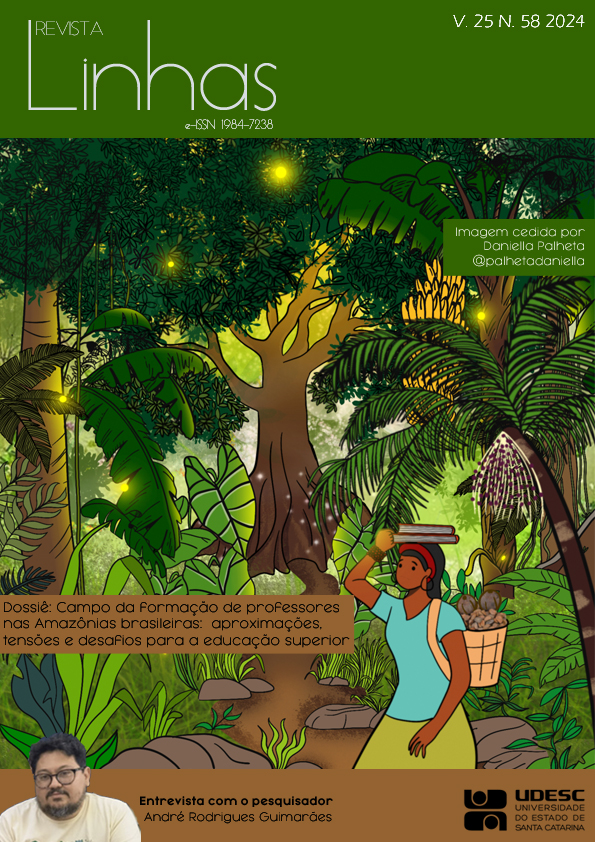Questões de gênero e raça na educação pelos olhos de mulheres negras da Rede de Mulheres Negras do Paraná
DOI:
https://doi.org/10.5965/1984723825582024452Palavras-chave:
mulheres negras, relações étnico-raciais, relações de gênero, processos educativos, Rede de Mulheres Negras do ParanáResumo
A Rede de Mulheres Negras do Paraná é uma organização sem fins lucrativos, autônoma e independente, fundada em 2006 para conferir visibilidade, garantir demandas da população negra do Paraná, reivindicar e ampliar a implementação de políticas públicas para mulheres negras, que realiza projetos nas áreas de educação, cultura, saúde, promoção e defesa dos direitos humanos, geração de trabalho e renda, valorização da identidade de gênero, sexualidade e raça/etnia. Essas questões serão mobilizadas no presente artigo por meio de entrevistas narrativas com dez de suas integrantes. Neste sentido, o artigo, de abordagem qualitativa, objetiva perceber a influência de processos educativos para a formação das mulheres negras militantes a partir da perspectiva de integrantes da Rede de Mulheres Negras do Paraná (RMN-PR). Teoricamente, filiou-se a estudos e pesquisas que abordam as temáticas de gênero e raça em uma perspectiva de aspiração interseccional. Os discursos das integrantes da RMN-PR apontam para escolas que têm a possibilidade de acolher, e o fazem em algumas situações, mas repetidas vezes negligenciam, subalternizam e discriminam esses sujeitos, em processos de coerção rotineiros. Há a possibilidade, entretanto, de uma educação de luta e resistência a partir do conhecimento experiencial de suas mães, além da potencialidade de acolhimento através da RMN-PR, transformando os ambientes escolar e familiar.
Downloads
Referências
ANDRADE, S. S. A entrevista narrativa ressignificada nas pesquisas educacionais pós-estruturalistas. In: MEYER, D. E.; PARAÍSO, M. A. (orgs.) Metodologia de pesquisas pós-crítica em educação. 2. ed. Belo Horizonte: Mazza Edições, 2014. p. 175-196.
ANZALDÚA, G. Queerizar a escritora. Loca, escritora y chicana. In: KEATING, Ana Louise (org.). The Gloria Anzaldúa reader. Durham: Duke University Press, 2009. p. 163-175.
CAREGNATO, R. C. A.; MUTTI, R. Pesquisa qualitativa: análise de discurso versus análise de conteúdo. Texto & Contexto-Enfermagem, Florianópolis, v. 15, n. 4, p. 679-684, 2006.
COLLINS, P. H. Epistemologia feminista negra. In: BERNARDINO-COSTA, J.; MALDONADOTORRES, N.; GROSFOGUEL, R. (orgs.). Decolonialidade e pensamento afrodiaspórico. Belo Horizonte: Autêntica Editora, 2018. E-book.
COLLINS, P. H.; BILGE, S. Interseccionalidade. [São Paulo]: Boitempo Editorial, 2021. E-book.
DELGADO, L. A. N. História oral e narrativa: tempo, memória e identidades. História oral, Rio de Janeiro, v. 6, p. 09-24, 2003.
FASHEH, M. Como erradicar o analfabetismo sem erradicar os analfabetos? Revista Brasileira de Educação, Rio de Janeiro, n. 26, p. 157-169, 2004.
FERREIRA, N. T. Como o acesso à educação desmonta o mito da democracia racial. Ensaio: Avaliação e Políticas Públicas em Educação, Rio de Janeiro, v. 27, p. 476-498, 2019.
GOMES, N. L. Alguns termos e conceitos presentes no debate sobre relações raciais no Brasil: uma breve discussão. In: MEC - SECAD (org.). Educação anti-racista: caminhos abertos pela Lei Federal no. 10.639/2003 - Secretaria de Educação Continuada, Alfabetização e Diversidade. Brasília, DF: Ministério da Educação, 2005. p. 39-61.
GOMES, N. L. Intelectuais negros e produção do conhecimento: algumas reflexões sobre a realidade brasileira In: SANTOS, B. S.; MENEZES, P. Epistemologias do Sul. São Paulo: Cortez, 2013. E-book.
GOMES, N. L. O movimento negro educador. Petrópolis: Vozes, 2019. E-book.
GONZALEZ, L. Por um feminismo afro-latino-americano. [São Paulo]: Editora Schwarcz-Companhia das Letras, 2020. E-book.
KILOMBA, Grada. Memórias da plantação: episódios de racismo cotidiano. Rio de Janeiro: Editora Cobogó, 2019.
MAGALHÃES, N. A. Narradores: vozes e poderes de diferentes pensadores. História oral, Rio de Janeiro, n. 5, p. 45-70, 2002.
ORLANDI, E. P. Discurso em análise: sujeito, ideologia e sentido. 3. ed. Campinas: Pontes, 2017.
ORLANDI, E. P. Análise de discurso: princípios e procedimentos. 5. ed. Campinas: Pontes, 2003.
PEREIRA, P. P. Queer nos trópicos. Contemporânea – Revista de Sociologia da UFSCar. São Carlos, v. 2, n. 2, p. 371-394, jul./dez 2012.
PENESB. Teoria Social e Relações Raciais. 1 vídeo (50 min.). Publicado no canal da Penesb, 25 nov. 2013. Disponível em: https://www.youtube.com/watch?v=H0jZoi-0JfM. Acesso em: 20 jul. 2021.
QUIJANO, A. Colonialidad del poder, eurocentrismo y America Latina. In: LANDER, E. (org.). Colonialidad del Saber, eurocentrismo y ciencias sociales. Ciudad Autonoma de Buenos Aires: CLACSO, set. 2005. p. 107-130. (ColecciónSur‐Sur)
REA, C. A.; AMANCIO, I. M. S. Descolonizar a sexualidade. Teoria queer of colour e trânsitos para o Sul. Cadernos Pagu, Campinas, v. 53, p. 1-38, 2018.
SILVA, P. V.; ROSEMBERG, F. Negros e brancos na mídia brasileira: discurso racista e práticas de resistência. In: VAN DIJK, T. (org.). Racismo e discurso na América Latina. São Paulo: Contexto: 2010. p. 73-117.
SILVA, P. Chegou a hora de dar a luz a nós mesmas: situando‐nos enquanto mulheres e negras. Cadernos CEDES, Campinas, v. 19, n. 45, p. 7-23, 1998.
SILVA, T. T. da. Documentos de identidade: uma introdução às teorias do currículo. 3. ed. Belo Horizonte: Autêntica Editora, 2016.
TELLES, E. O significado da raça na sociedade brasileira. Princeton e Oxford: Princeton University Press, 2012.
Downloads
Publicado
Como Citar
Edição
Seção
Licença
Copyright (c) 2024 Revista Linhas

Este trabalho está licenciado sob uma licença Creative Commons Attribution-NonCommercial-NoDerivatives 4.0 International License.
Os artigos publicados pela revista são de uso gratuito, destinados a aplicações educacionais e não comerciais. Os direitos autorais são todos cedidos à revista. Os artigos cujos autores são identificados representam a expressão do ponto de vista de seus autores e não a posição oficial da Revista Linhas ou do Programa de Pós-Graduação em Educação da Universidade do Estado de Santa Catarina.

A Revista Linhas está licenciada com uma Licença Creative Commons - Atribuição-NãoComercial-SemDerivações 4.0 Internacional.


